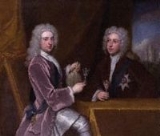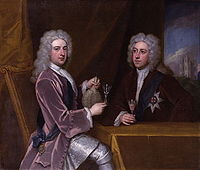
Henry Clinton, 7th Earl of Lincoln
Encyclopedia

Order of the Garter
The Most Noble Order of the Garter, founded in 1348, is the highest order of chivalry, or knighthood, existing in England. The order is dedicated to the image and arms of St...
, PC (1684 – 7 September 1728) was the son of Francis Clinton, 6th Earl of Lincoln and his second wife Susan Penniston, daughter of Anthony Penniston. Upon his father's death in 1693, he became the 7th Earl of Lincoln, a peerage he held until his death in 1728.
On 16 May 1717, he married Lucy Pelham, a sister of Thomas Pelham-Holles, 1st Duke of Newcastle, and they had two children:
- George Clinton, 8th Earl of Lincoln (1718–1730), cousin of General Sir Henry ClintonHenry Clinton (American War of Independence)General Sir Henry Clinton KB was a British army officer and politician, best known for his service as a general during the American War of Independence. First arriving in Boston in May 1775, from 1778 to 1782 he was the British Commander-in-Chief in North America...
of the American Revolutionary WarAmerican Revolutionary WarThe American Revolutionary War , the American War of Independence, or simply the Revolutionary War, began as a war between the Kingdom of Great Britain and thirteen British colonies in North America, and ended in a global war between several European great powers.The war was the result of the...
. - Henry Fiennes Pelham-Clinton, 2nd Duke of Newcastle (1720–1794)
As the brother in law of a prominent politician (Newcastle), he served in several positions over his lifetime. In 1719 he was one of main subscribers in the Royal Academy of Music (1719), a corporation that produced baroque opera on stage. From 1715 to 1720, he was the Paymaster of the Forces
Paymaster of the Forces
The Paymaster of the Forces was a position in the British government. The office, which was established 1661 after the Restoration, was responsible for part of the financing of the British Army. The first to hold the office was Sir Stephen Fox. Before his time it had been the custom to appoint...
. Three years later, he was named the Lord Lieutenant of the Tower Hamlets and Constable of the Tower of London, a prestigious position. In 1725, the refusal of Lord Pulteney
William Pulteney, 1st Earl of Bath
William Pulteney, 1st Earl of Bath, PC was an English politician, a Whig, created the first Earl of Bath in 1742 by King George II; he is sometimes stated to have been Prime Minister, for the shortest term ever , though most modern sources reckon that he cannot be considered to have held the...
to follow Walpole's instructions led to his dismissal as Cofferer of the Household
Cofferer of the Household
The Cofferer of the Household was formerly an office in the English and British Royal Household.The holder had special charge over other officers of the household and was an officer of state and a member of the Privy Council and the Board of Green Cloth....
. Clinton was appointed to replace him, resulting in him also being appointed ex officio to the Privy Council
Privy council
A privy council is a body that advises the head of state of a nation, typically, but not always, in the context of a monarchic government. The word "privy" means "private" or "secret"; thus, a privy council was originally a committee of the monarch's closest advisors to give confidential advice on...
. He served in this position as an officer of state until his demise in 1728.

